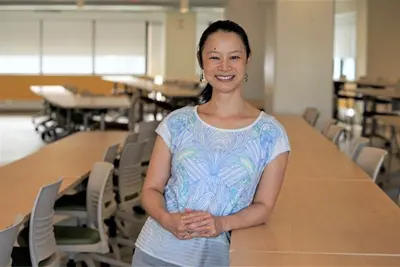New Space in HSSB Brings Academic Success Resources Together
 Image by K. Webster
Image by K. Webster
08/24/2021
By Katharine Webster
When nursing major Fritza Jeudy began taking Human Anatomy and Physiology in fall 2019 – a required class for all first-year students in the Zuckerberg College of Health Sciences – she was overwhelmed.
She studied as hard as she could, but she was dismayed at her performance on the first big exam. So Jeudy immediately sought out her instructor, Asst. Teaching Prof. Brent Shell, for help.
Shell set her up with a study group in the former Student Resource Center in Weed Hall. The center featured student tutors, anatomical models like the ones in her lab course, and information about effective study methods.
A commuter student from Malden, Massachusetts, Jeudy began going to the center between classes to study, either on her own or with classmates – and her grades soared.
 Image by Karen Angelo
Image by Karen Angelo
“Even after I started to do well, I never stopped going there. It just became part of my routine,” she says. “I met a lot of great friends there, as well – a lot of hard-working nursing students.”
This fall, the Zuckerberg College of Health Sciences is folding the former center’s services into the brand-new “Health Sciences Hub,” located on the first floor of the Health and Social Sciences Building (HSSB). The Hub will offer college-based advising, tutoring for Anatomy and Physiology, resources to support upper-level classes, space for teaching assistants and faculty to hold office hours and exam review sessions, and meeting rooms that student study groups and clubs can use.
Dean Shortie McKinney and her team envision the Hub as a place that brings together everything students need to thrive during all four years, says Associate Dean Nicole Champagne. Student and faculty input in the fall will help to shape additional uses and resources for the Hub.
“We look at the Hub as an active academic support space,” Champagne says. “It’s really a place for students to create learning opportunities, to engage with their academic content, to engage with their peers about academic content, and engage with faculty outside of the classroom.”
 Image by K. Webster
Image by K. Webster
The new assistant dean, Brenda Geiger, will have her office in the Hub, as will the college-based advisors who serve all first-year students. There will also be group office space for teaching assistants and smaller rooms where faculty and students can meet.
“We hope to have more faculty holding their office hours in the Hub,” Champagne says. “We really want it to be a lively, multipurpose space.”
Champagne also hopes to bring in workshops for students, such as events about careers, research opportunities, presentation skills and professional communication.
“Students often need help with ‘soft skills’ that may actually be harder skills,” she says. “We’re really looking to enhance those offerings that aren’t necessarily connected to a particular course.”
 Image by K. Webster
Image by K. Webster
The new Health Sciences Hub is accompanied by some changes to the curriculum for Human Anatomy and Physiology, Champagne says. This academic year, faculty will record videos for students to watch before the week’s classes, while in-person class time will be spent on more complex physiologic concepts and group work on clinical case studies designed to help students apply and assimilate the material.
For sophomores, the Hub is in the process of hiring upper-level students as “learning assistants” to help with the most challenging science class, Physiological Chemistry. Because this year’s sophomores all took Human Anatomy and Physiology online, the faculty want to make sure they have solid support as they take this critical, in-person lab class, Champagne says.
The tutors are overseen by Shell and they are also trained and certified by the Centers for Learning, Advising and Student Success (CLASS). While the Health Sciences Hub will only be open on weekdays at first, students who need evening help can also get tutoring through CLASS, both in person and remotely, in several required courses.
Senior nursing major Kristina Ogbarmey-Tetteh, who began working as a tutor online in spring 2021, is looking forward to meeting with students in person and helping them to form study groups. During the pandemic, she says that the tutors developed a lot of online resources, too.
 Image by K. Webster
Image by K. Webster
“I felt like I needed clarification about what was important to study from someone who went through the course,” she says. “Your peers can give you more personal advice, so that you’re working smarter, not harder.”
Augustin Cruz, a junior exercise science major, says that online tutoring provided a lifeline when he was studying Physiological Chemistry remotely last year and taking Physics I at 5 a.m. because of the three-hour time difference between campus and his home in Las Vegas.
Cruz sought out Shell for advice – and began working with the student tutors online. Whenever he got stressed, he went to the former Student Resource Center’s website.
“I could ask questions I didn’t have a chance to ask my professors during class, attend study sessions, understand things I got wrong, and even get study tips, like how I could efficiently organize my notes and how I should prioritize things,” he says.
“I was able to gain different perspectives from the tutors, I was able to recognize my weaknesses, and I was less anxious and stressed because I knew that any time I needed help, I could always go to the website.”
This fall, most tutoring will be in person in the Hub. But the Centers for Learning will offer some online tutoring appointments, too. And Champagne hopes that soon, while keeping student safety in mind, the Hub will be able to offer some extended evening and weekend hours.
“We’ll see how students use the space, how faculty use the space, and then adapt as we need to,” she says.




